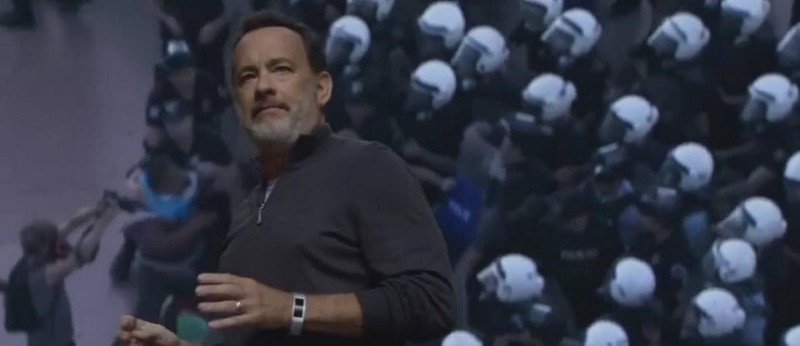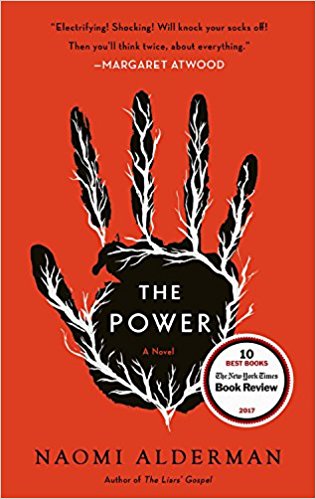 In Sylvain Neuvel’s terrific sci-fi novel SLEEPING GIANTS (Del Rey), a young girl named Rose is riding her bike when she falls through the earth into the palm of a giant metal hand that had been buried there for millennia. Years later, the hand is in government storage, and Rose is now an adult scientist studying the hand. When she concludes the hand is of alien origin and must be part of a larger structure, perhaps a robot, a shadowy government operator begins pulling strings to find the missing pieces and find out exactly what it’s for. A weapon, or something else?
In Sylvain Neuvel’s terrific sci-fi novel SLEEPING GIANTS (Del Rey), a young girl named Rose is riding her bike when she falls through the earth into the palm of a giant metal hand that had been buried there for millennia. Years later, the hand is in government storage, and Rose is now an adult scientist studying the hand. When she concludes the hand is of alien origin and must be part of a larger structure, perhaps a robot, a shadowy government operator begins pulling strings to find the missing pieces and find out exactly what it’s for. A weapon, or something else?
The novel is presented as a series of documents, most of them interviews between the government agent (who goes unnamed, and wonderfully emerges as a very tricky operator with brutal social skills) and the project team participants. At first the convention of using documents threw me, as we have people in formal interviews going into exposition about their childhood and whatnot–great for establishing character in fiction, but pushing suspension of disbelief. As the novel finds its depth and the mystery builds, however, Neuvel hits his stride, and the result is a very intelligent and engaging story, sort of like ARRIVAL but with far more action and character development.
The novel was turned into a trilogy, and I’ll be reading the second one shortly. I love the robot, the characters are interesting, the government agent is terrific, and I’ll be happy to see what happens next in this realistic, intelligent story.

 Robert Guffey’s UNTIL THE LAST DOG dies presents a novel type of apocalypse: What if a disease made the world lose its sense of humor?
Robert Guffey’s UNTIL THE LAST DOG dies presents a novel type of apocalypse: What if a disease made the world lose its sense of humor?
 Naomi Alderman’s THE POWER is a novel about the final battle of the sexes that results from women undergoing an evolutionary change in which they gain the power to wield electrical current with their hands. Suddenly, men become the “weaker sex.” Women push back until a complete societal reversal occurs, as they gain not just the power to hurt men at will, but all of the other power that comes with it. I found this story, a big ideas novel written in the tradition of THE HANDMAID’S TALE (and as powerful), a work of genius that got me thinking on several levels. The novel came out in 2016 and won the Baileys Women’s Prize for Fiction in 2017.
Naomi Alderman’s THE POWER is a novel about the final battle of the sexes that results from women undergoing an evolutionary change in which they gain the power to wield electrical current with their hands. Suddenly, men become the “weaker sex.” Women push back until a complete societal reversal occurs, as they gain not just the power to hurt men at will, but all of the other power that comes with it. I found this story, a big ideas novel written in the tradition of THE HANDMAID’S TALE (and as powerful), a work of genius that got me thinking on several levels. The novel came out in 2016 and won the Baileys Women’s Prize for Fiction in 2017. In SAVING CAPITALISM (2017), a documentary on Netflix, former Secretary of Labor Robert Reich highlights the major points in his book with the same title while having conversations with ordinary Americans about how changes in the economy are affecting them. This spot-on analysis of how American democracy has become corrupted by corporate influence, and what this means for the economy and average Americans, is essential viewing for people of all political stripes.
In SAVING CAPITALISM (2017), a documentary on Netflix, former Secretary of Labor Robert Reich highlights the major points in his book with the same title while having conversations with ordinary Americans about how changes in the economy are affecting them. This spot-on analysis of how American democracy has become corrupted by corporate influence, and what this means for the economy and average Americans, is essential viewing for people of all political stripes.